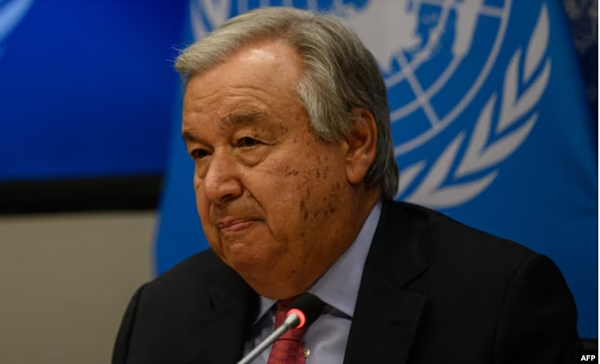
U.N. Secretary-General Antonio Guterres offered proposals Thursday to deal with what he says is an emerging multipolar world order that is characterized by rising geopolitical tensions, conflicts and emerging technologies.
“Today’s new threats to peace create new demands on us,” Guterres told U.N. member states.
He said his recommendations, outlined in a policy brief called a “New Agenda for Peace,” recognize the interlinked nature of many global challenges.
“Conflicts have become more complex, deadly and harder to resolve,” he said. “Last year saw the highest number of conflict-related deaths in almost three decades.”
He said Russia’s invasion of Ukraine has made it harder to address many global challenges.
“If every country fulfilled its obligations under the [U.N.] Charter, the right to peace would be guaranteed,” Guterres said. “But when countries break those pledges, they create a world of insecurity for everyone.”
Development goals
The secretary-general said one of the keys to addressing the problems plaguing the planet is to accelerate work on the 2030 Agenda, a set of key global development goals. He noted that conflict prevention and sustainable development are mutually reinforcing.
“It is no coincidence that countries affected by conflict are farthest behind on the sustainable development goals,” he said.
He expressed concern about the possibility of nuclear war, which has reemerged with Russia’s war in Ukraine, and he called for the elimination of nuclear weapons in general.
“Pending their total elimination, states possessing nuclear weapons must commit to never use them,” Guterres said.
He urged nations to reduce military spending and ban inhumane and indiscriminate weapons.
New technologies
The U.N. chief also expressed concern about new technologies that offer the potential for huge progress, but also, in the case of generative artificial intelligence and lethal autonomous weapons (also known as “killer robots”), are “creating new ways in which humanity can annihilate itself.”
On that front, Guterres says the international community should adopt, by 2026, a legally binding instrument to prohibit such autonomous weapons. He is also backing the idea of creating a new global body to mitigate the peace and security risks of AI. He envisions it being similar in structure and mandate to the International Atomic Energy Agency, which is the organization’s nuclear watchdog agency.
The secretary-general said he plans to convene a high-level advisory body to outline options on global AI governance, which will report back by the end of this year.
Among his other recommendations, Guterres calls for the inclusion of women in leadership and decision-making, urging quotas where necessary.
He also calls for “broad-based reflection” on the future of U.N. peacekeeping operations. The U.N. spends billions annually on its peacekeeping missions, but with limited success. Two of its largest missions – in Mali and the Democratic Republic of the Congo – are presently winding down at the request of those nations.
Guterres urged nations to get involved in discussions about his proposals. In 2024, the United Nations is planning a Summit of the Future to address global risks and opportunities. The secretary-general told member states he hopes his recommendations will help in their deliberations.
Source: voanews.com























